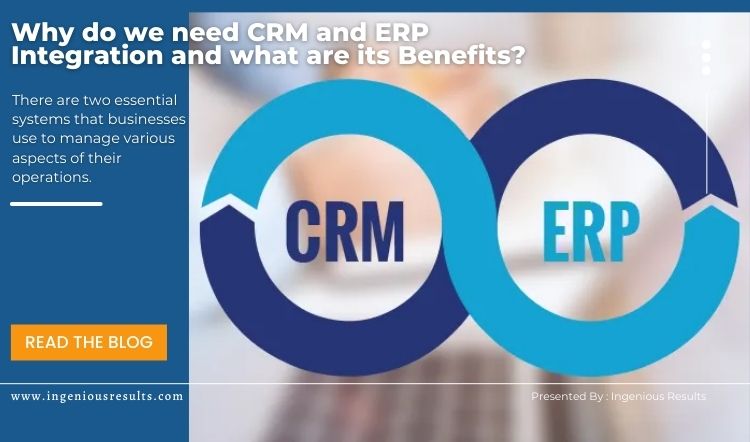Why do we need CRM and ERP Integration and what are its Benefits?

Customer Relationship Management (CRM) and Enterprise Resource Planning (ERP) are two essential systems that businesses use to manage various aspects of their operations. Integrating CRM and ERP systems can offer several benefits, as these systems often handle different aspects of a business but share valuable data that, when combined, can provide a more comprehensive view of the organization. Here are some reasons why CRM and ERP integration is beneficial:
- Data Synchronization:
- Elimination of Data Silos:
CRM systems typically focus on customer interactions, sales, and marketing data, while ERP systems manage core business processes such as finance, inventory, and supply chain. Integrating these systems helps break down data silos, ensuring that information flows seamlessly between departments, preventing duplicate data entry and improving data accuracy.
2. 360-Degree View of Customers
- Improved Customer Insights:
Integrating CRM and ERP provides a holistic view of customer data. This enables businesses to understand customer behaviours, preferences, and purchase history in conjunction with financial transactions and order fulfilment. This comprehensive view helps in creating more targeted marketing strategies and improving customer service.
3. Streamlined Processes
- Efficient Workflows:
Integration streamlines business processes by automating workflows and reducing manual data entry. For example, when a sales team closes a deal in the CRM system, the integrated ERP system can automatically generate and process the corresponding order, update inventory levels, and initiate invoicing without manual intervention.
4. Enhanced Sales and Customer Service
- Timely Access to Information:
Sales teams can benefit from real-time access to inventory levels, order status, and customer credit information. This helps in making informed decisions, providing accurate delivery timelines, and preventing overcommitting on products or services.
5. Optimized Inventory Management
- Accurate Demand Planning:
Integration allows for better coordination between sales and inventory management. Sales data from CRM systems can be used to predict demand, optimize stock levels, and reduce excess inventory, leading to cost savings and improved cash flow.
6. Financial Visibility
- Real-time Financial Reporting:
Integrating ERP and CRM provides real-time financial data. Sales transactions, expenses, and revenue information are automatically updated, providing accurate financial reporting and helping in making strategic financial decisions.
7. Improved Decision-Making
- Comprehensive Business Intelligence:
Integration enables businesses to generate comprehensive reports and analytics by combining data from CRM and ERP systems. This aids in better decision-making by providing a more complete picture of the organization’s performance and trends.
8. Efficient Order Fulfilment
- Faster Order Processing:
Integration ensures that sales orders generated in the CRM system seamlessly flow into the ERP system for order fulfilment. This reduces order processing time, minimizes errors, and enhances customer satisfaction.
9. Cost Savings
- Reduced Manual Effort:
Automation and elimination of manual data entry reduce the risk of errors and save time. This, in turn, leads to operational efficiency and cost savings.
Ingenious Results helps to give you the service of CRM and ERP. In this summary, CRM and ERP integration facilitates a more connected and efficient business environment by breaking down data silos, providing a unified view of customer and business data, streamlining processes, and improving decision-making across the organization.
